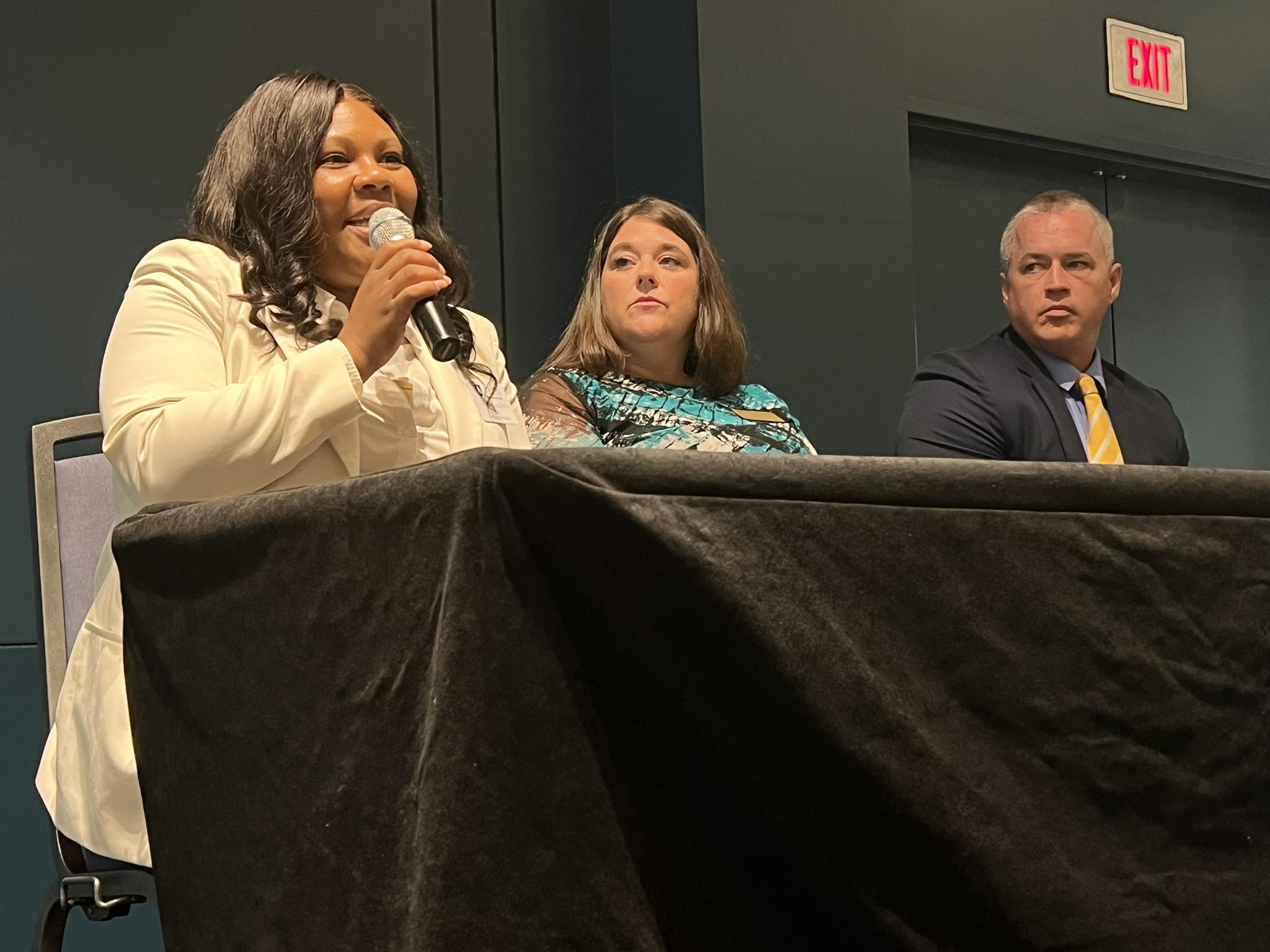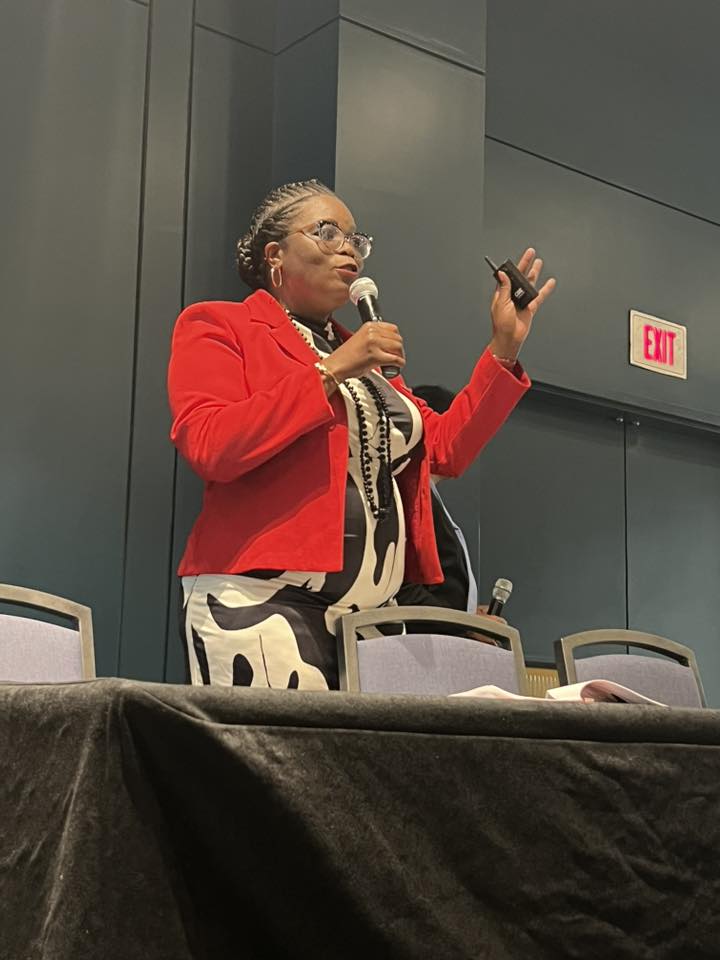Transfer professionals from colleges and universities across the state converged in Columbia Oct. 8 for a day of conversation and collaboration focused on optimizing the student transfer experience in South Carolina.
The annual transfer convening, hosted by the South Carolina Commission on Higher Education, was created to empower higher education leaders, faculty in their efforts to help students move more seamlessly from one institution to another on their paths toward degree completion. Presenters shared data-driven strategies, successful partnership models, and innovative tools supporting smoother transfers between the state’s two- and four-year institutions.
 This year’s theme was “The Power of Partnership: Advancing Transfer Through Collaboration.”
This year’s theme was “The Power of Partnership: Advancing Transfer Through Collaboration.”
CHE President and Executive Director Dr. Jeff Perez welcomed attendees to start the day, followed by an update from South Carolina Transfer Leadership Council co-chairs Dr. Lloyd Willis, dean of the College of Graduate and Online Studies at Lander University, and René Sawyer, dean of the School of Arts and Sciences at Greenville Technical College. They discussed the considerable progress the state has made toward implementing recommendations of the 2023 South Carolina Transfer Action Plan, as well as prioritizing goals to improve transfer alignment.
Transfer Explorer sees early success
In February, several institutions across the state partnered with nonprofit research and consulting organization Ithaka S+R for a pilot platform to improve credit transparency and student mobility. South Carolina was one of only three states selected to participate.
The Transfer Explorer platform integrates directly with institutional systems to allow real-time updates without additional data entry requirements from institutions. Chris Buonocore, Ithaka Transfer Explorer Manager, noted that this automation ensures that visitors always see the most accurate and current transfer information.
![]() Emily Tichenor, Senior Program Manager at Ithaka S+R, explained that Transfer Explorer is part of Ithaka’s broader Holistic Credit Mobility framework, which views student learning as the foundation for all transfer and credit-recognition efforts.
Emily Tichenor, Senior Program Manager at Ithaka S+R, explained that Transfer Explorer is part of Ithaka’s broader Holistic Credit Mobility framework, which views student learning as the foundation for all transfer and credit-recognition efforts.
During a demonstration of the platform, Buonocore noted that Transfer Explorer is intentionally open access with no login required so students, advisors, and families can explore how prior learning will transfer among institutions. Results can also be saved and shared, which increases student involvement and awareness while also streamlining workflow for institutional advisors.
“Students deserve clear, accessible information about how their hard-earned credits apply,” Tichenor said. “Transfer Explorer helps them make informed choices and move efficiently toward completing their degree.”
Transfer Explorer now serves students at eight South Carolina institutions, with several more scheduled to join soon.
Transfer’s role in building South Carolina’s workforce talent pipeline
During an afternoon breakout session, Perez outlined the role of the Coordinating Council for Workforce Development (CCWD) in strengthening the state’s education-to-employment pipeline. He described the council as a key driver in aligning education, training, and workforce needs from pre-K through employment by uniting state agencies, colleges, businesses, and economic development organizations to build South Carolina’s talent pipeline.
Perez also discussed the development of the CCWD-led FindYourFutureSC portal, envisioned as a one-stop resource for students, educators, and employers to explore degree pathways, training options, and internship opportunities. He encouraged transfer professionals to think creatively about the intersection of transfer, attainment, and career pathways.
“Every successful transfer represents a student achieving their educational goals and taking a step toward contributing to South Carolina’s economy,” Perez said. “Our collective efforts are building a stronger, more connected higher education system that puts students first.”
He concluded by stressing the importance of including “essential skills” such as communication and teamwork in higher education, which he noted that employers consistently value across industries.
Credit mobility for Veterans

Alfie B. Mincy, CHE’s program coordinator for the South Carolina National Guard College Assistance Program and Veterans Outreach, along with Dr. Karen Woodfaulk, CHE Student Services director, led a session titled “SC Military Credit Mobility for Prior Learning: What’s in Your Policy?” They urged participating institutions to examine and strengthen their credit‐for‐prior‐learning (CPL) policies for military and nontraditional learners.
Mincy outlined several different CPL types—transfer credit, proficiency credit (via exams or assessments), and military credit (e.g. Joint Services Transcripts, individual military training assessments)—and emphasizing the need for institutions to clearly define which of these they accept and how.
Attendees also participated in an online “scavenger hunt” exercise to explore ease of access, clarity, contact information, and currency of military transfer policies on their own institutional websites. This included seeing how quickly policies could be located (some within three clicks), the presence or absence of dedicated pages for military learners, and whether policies were current. Participants also reviewed student case studies to identify how CPL policies might apply in real-life scenarios.
Mincy concluded by asking attendees to identify steps to improve military CPL support at their institutions. Some of the proposed steps included revising websites, reviewing departmental policies, and creating institutional work groups focused on military credit mobility.
A day of progress and partnerships
Sessions throughout the day detailed many practical approaches to advancing transfer policies and practices:
- Transforming Transfer: Building, Expanding, and Sustaining Strategic Pathways Between YTC and Winthrop and Beyond showcased collaboration between York Technical College and Winthrop University and was led by Dr. Amanda James, Winthrop University.
- The Regional Transfer Collaboration Panel allowed institutional representatives to share successful transfer partnership models among regional college and universities. Pairs included Horry-Georgetown Tech and Coastal Carolina, USC Columbia and Midlands Tech, Clemson and Tri-County Tech, and others.
- The day concluded with The Collaborative Edge: Strategies for Robust Partnerships, led by Dr. Rosline Sumter and Jennifer Black of the South Carolina Technical College System, emphasizing the importance of sustained collaboration and detail-oriented agreements to maintain momentum in transfer initiatives.
Supporting materials and presentations from the event will remain available on the CHE website for continued access by campus representatives and transfer stakeholders.
